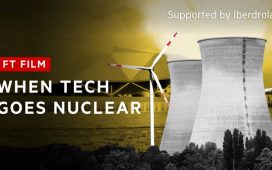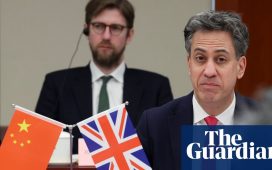Three big UK manufacturers won free carbon emission allowances worth millions of pounds for factories that were mothballed or slashing production, highlighting loopholes in the British net zero regime.
The government granted nearly £46mn of surplus free carbon credits to agricultural group CF Fertilisers and Jim Ratcliffe’s Ineos for sites the companies then permanently closed.
Embattled metals magnate Sanjeev Gupta’s Liberty Steel was also given surplus emissions allowances for a steel mill in Wales that was idled this year.
The findings by the Financial Times, based on data published by the government, raise questions about the UK’s management of its carbon market, where companies can sell surplus credits for profit.
“The rules as they stand give economic rewards for plants which are shutting down, where jobs are lost,” said Sam Van den plas, policy director at Carbon Market Watch, which scrutinises carbon pricing schemes.
“This undermines climate goals and doesn’t serve any economic benefit other than creating a windfall for the companies,” he added.
The UK awards big manufacturers carbon credits to offset their emissions on a per site basis. The awards are measured against production over the previous two years, meaning idled factories can win surplus allowances.
The Emissions Trading System scheme is intended to give companies flexibility to adjust production levels, but surplus awards are not clawed back if a site remains inactive or is permanently closed.
CF Fertilisers did not respond to requests for comment. Ineos said it “fully complied with the rules of and reporting requirements of the UK ETS scheme”. Liberty Steel’s parent, GFG Alliance, declined to comment.
The Department for Energy Security and Net Zero said it was reviewing the allocation of free allowances to make it “as robust as it can be”.
“Where a company closes or leaves the UK, their allowances are no longer distributed in the following year,” the department noted.
“As previously announced, we are reviewing free allocation rules to make the system as robust as it can be while continuing to support UK businesses through the transition to net zero,” it added.
The UK’s carbon trading system puts a price on CO₂ for energy companies and large manufacturers to help reduce pollution over time. Some free carbon credits are awarded to limit the risk of businesses relocating to places with less stringent environmental penalties.
High levels of free allowances under the scheme helped push the UK’s carbon price to a record low earlier this year.
The UK allowances are adjusted annually and assessed on a two-year trailing basis, meaning there can be a lag between a fall or increase in production and the number of allowances companies receive.
Companies that have cut production at a particular site can end up with allowances exceeding their emissions in the year or two after, which in theory can be utilised if a company eventually restores production.
But there is no obligation to hand them back if they then shut down a site for good.
“This is an absurd loophole that the government can and should close,” said Doug Parr, policy director at Greenpeace UK, whose Unearthed unit published separate research on the topic on Monday.
“This scheme is supposed to reward businesses that make genuine efforts to clean up their operations, not give carbon freebies to firms who shut down plants,” he added.

CF Fertilisers, owned by the US conglomerate CF Industries, won 488,602 allowances in 2022 for a site in Ince, Cheshire, it had idled the previous year as gas prices soared.
In June 2022, the company announced plans to “permanently close” the Ince site with the loss of around 350 jobs. CF recorded 481,848 surplus allowances in 2022 for Ince, worth £37.6mn at 2022’s average price of £78.
The company received a £12.3mn bailout from the UK government in September 2021 for its Billingham plant to help with rising gas prices.
CF’s most recent UK accounts show it has earned more than £32mn selling UK emissions credits so far in 2023.
Ineos started decommissioning its 40-year-old nitriles plant in Seal Sands, Teesside, in 2021, after announcing plans to close it in 2019. The site received 148,622 surplus allowances in 2021 worth £8.3mn at average prices that year.
The company did not comment on whether the allowances had been kept or sold. Ineos in 2022 did not receive any allowances or report any emissions for the now fully closed site.

In its accounts for the year ending December 31 2021, Ineos Nitriles said it sold carbon credits worth £14.9mn during the year, helping it post a £25.8mn operating profit.
Liberty Steel reduced output at its rolling mill in Newport, South Wales in 2022 and in January this year idled the plant as part of a UK-wide restructuring. It laid off about 140 of the site’s 170-strong workforce, union officials confirmed. The site is now a distribution hub.
Newport received 11,028 surplus allowances in 2022, amounting to a net surplus of 6,242 over the two-year period 2021-22 once emissions are taken into account. These were worth almost £500,000 at 2022’s average price.
Liberty Steel said in January it would restart idled plants when conditions allow.
Climate Capital

Where climate change meets business, markets and politics. Explore the FT’s coverage here.
Are you curious about the FT’s environmental sustainability commitments? Find out more about our science-based targets here











